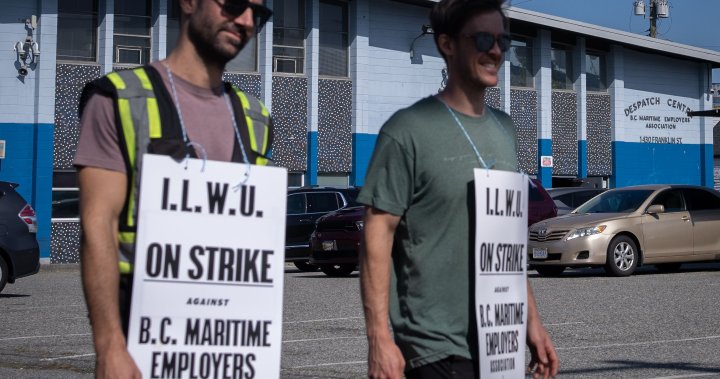
B.C. port strike: What to know as disruption stretches into day 4
Global News
Striking workers at B.C. ports have yet to strike a new deal with employers. Here's where talks stand, what the government has said and what impacts you can expert.
While some Canadians were lighting off fireworks and relaxing with friends over the Canada Day long weekend, longshoremen staffing some of the busiest ports in British Columbia were taking to the picket lines.
A strike among more than 7,000 cargo loaders at roughly 30 B.C. ports is stretching into its fourth day on Tuesday.
A stymying of trade at the ports is significant — an estimated 25 per cent of Canada’s imports and exports flows through the Port of Vancouver and other marine gateways along the west coast — with experts saying a prolonged strike could do “major damage” to the economy.
While both the BC Maritime Employers Association (BCMEA) and International Longshore and Warehouse Union Canada (ILWU) remain at the table as workers attempt to negotiate better pay and job security against contracting out labour, the latest developments on Monday show talks might have hit a roadblock.
The BCMEA said it no longer believes it can find a deal at the bargaining table, accusing ILWU of having “entrenched their positions” and calling demands for compensation unreasonable.
Union leadership has accused the employers of negotiating in bad faith, and has argued workers ought to share in “record high profits” at the ports.
“We hope the Association is not hiding behind the threat of back-to-work legislation and binding arbitration to avoid engaging in bargaining with the Union,” said ILWU president Rob Ashton in a statement late Monday.
UBC Sauder School of Business professor Werner Antweiler told Global News last week that the federal and provincial governments likely would not wait more than two weeks into a strike before acting and potentially legislating striking longshoremen back to work, given the potential economic impact as shipping containers pile up at B.C. ports.

 Run 3 Space | Play Space Running Game
Run 3 Space | Play Space Running Game Traffic Jam 3D | Online Racing Game
Traffic Jam 3D | Online Racing Game Duck Hunt | Play Old Classic Game
Duck Hunt | Play Old Classic Game